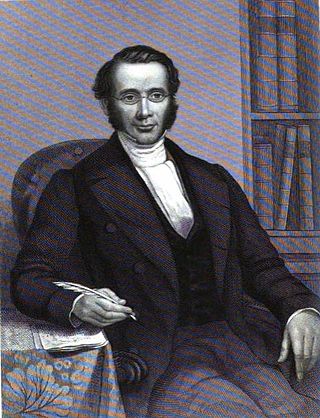Baptists form a major branch of evangelical Protestantism distinguished by baptizing only professing Christian believers and doing so by complete immersion. Baptist churches generally subscribe to the doctrines of soul competency, sola fide, sola scriptura and congregationalist church government. Baptists generally recognize two ordinances: baptism and communion.

The Christian Church (Disciples of Christ) is a mainline Protestant Christian denomination in the United States and Canada. The denomination started with the Restoration Movement during the Second Great Awakening, first existing during the 19th century as a loose association of churches working towards Christian unity, then slowly forming quasi-denominational structures through missionary societies, regional associations, and an international convention. In 1968, the Disciples of Christ officially adopted a denominational structure at which time a group of churches left to remain nondenominational.

Congregationalism is a Protestant, Reformed (Calvinist) tradition in which churches practice congregational government; where each congregation independently and autonomously runs its own affairs.
Trefeca, located between Talgarth and Llangorse Lake in what is now south Powys in Wales, was the birthplace and home of the 18th-century Methodist leader Howell Harris (1714–1773),. It was also the site of two Calvinistic Methodist colleges at different times; the first sponsored by Selina, Countess of Huntingdon in the late eighteenth century; the second supported by the Welsh Calvinistic Methodist Connexion in the later nineteenth century.
The Countess of Huntingdon's Connexion is a small society of evangelical churches, founded in 1783 by Selina Hastings, Countess of Huntingdon, as a result of the Evangelical Revival. For many years it was strongly associated with the Calvinist Methodist movement of George Whitefield.
Connexionalism, also spelled connectionalism, is the theological understanding and foundation of Methodist ecclesiastical polity, as practised in the Methodist Church in Britain, Ireland, Caribbean and the Americas, United Methodist Church, Free Methodist Church, African Methodist Episcopal and Episcopal Zion churches, Bible Methodist Connection of Churches, Christian Methodist Episcopal Church, and many of the countries where Methodism was established by missionaries sent out from these churches. It refers to the way in which Methodist churches and other institutions are connected and work together to support one another, share resources, and carry out mission and ministry. The United Methodist Church defines connection as the principle that "all leaders and congregations are connected in a network of loyalties and commitments that support, yet supersede, local concerns." Accordingly, the primary decision-making bodies in Methodism are conferences, which serve to gather together representatives of various levels of church hierarchy.
Free Church Federation is a voluntary association of British Nonconformist churches for cooperation in religious social work. It was the outcome of a unifying tendency displayed during the latter part of the 19th century.

Ecclesiastical polity is the government of a church. There are local (congregational) forms of organization as well as denominational. A church's polity may describe its ministerial offices or an authority structure between churches. Polity relates closely to ecclesiology, the theological study of the church.

James Sherman, was an English Congregationalist minister. He was an abolitionist, and a popular preacher at The Castle Street Chapel in Reading from 1821 to 1836. He and his second wife Martha Sherman made a success of Surrey Chapel, Blackfriars, London from 1836−54. Martha died in 1848.

Selina Hastings, Countess of Huntingdon was an English Christian and religious leader who played a prominent part in the religious revival of the 18th century and the Methodist movement in England and Wales. She founded an evangelical branch in England and Sierra Leone, known as the Countess of Huntingdon's Connexion.
Baptist beliefs are not completely consistent from one church to another, as Baptists do not have a central governing authority. However, Baptists do hold some common beliefs among almost all Baptist churches.
The Wesleyan Methodist Church was the majority Methodist movement in England following its split from the Church of England after the death of John Wesley and the appearance of parallel Methodist movements.

West Street Baptist Church is a Baptist church in East Grinstead, a town in the district of Mid Sussex, one of seven local government districts in the English county of West Sussex. Founded in 1810 as a chapel linked to the Countess of Huntingdon's Connexion, it was the first Nonconformist place of worship in East Grinstead; the town's subsequent development made it a local centre of both Protestant Nonconformity and alternative religions. The red-brick building is still used by a Baptist community, and is protected as a Grade II listed building.
John Bradford (1750–1805) was an English dissenting minister.

Trinity Congregational Church, later known as Union Chapel, is a former place of worship for Congregationalists and Independent Christians in Arundel, an ancient town in the Arun district of West Sussex, England. Protestant Nonconformism has always been strong in the town, and the chapel's founding congregation emerged in the 1780s. After worshipping elsewhere in the town, they founded the present building in the 1830s and remained for many years. Former pastors included the poet George MacDonald. Robert Abraham's distinctive neo-Norman/Romanesque Revival building was converted into a market in the 1980s and has been renamed Nineveh House. The church is a Grade II Listed building.

Benjamin Parsons (1797–1855) was an English congregational minister. He was known as a political campaigner who involved his congregation.

South Street Free Church is a church in the centre of Eastbourne, a town and seaside resort in the English county of East Sussex. Originally Congregational, it is now aligned to the Countess of Huntingdon's Connexion—a small group of Evangelical churches founded by Selina Hastings, Countess of Huntingdon during the 18th-century Evangelical Revival. The church was founded in 1897 as an offshoot from an earlier Congregational chapel, and initially met in hired premises. Local architect Henry Ward designed the present church in 1903; the "characterful" and "quirky" Arts and Crafts-style building has been listed at Grade II by Historic England for its architectural and historical importance.

Ote Hall Chapel is a place of worship belonging to the Countess of Huntingdon's Connexion—a small Nonconformist Christian denomination—in the village of Wivelsfield in East Sussex, England. The Connexion was established as a small group of Evangelical churches during the 18th-century Evangelical Revival by Selina Hastings, Countess of Huntingdon, and this chapel is one of the earliest: founded by the Countess herself in 1778 as a daughter church of the original chapel in Brighton, it has been in continuous use since 1780. Historic England has listed the building at Grade II for its architectural and historical importance.

Huntingdon Hall is a Grade II* listed theatre and concert venue located in Worcester, England.












